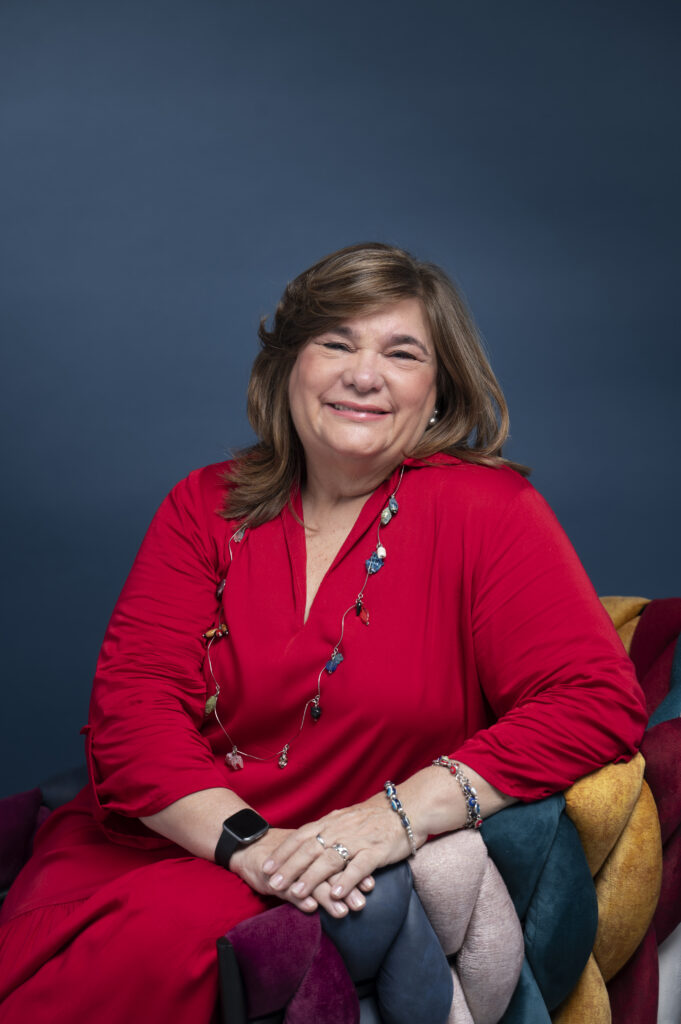No going back
Long-serving IBIA stalwart Eugenia Benavides Buitrago tells World Bunkering's Editor David Hughes that once you go into bunkering “there's no going back”.

DH: Can you sketch out how you came into the petroleum and then bunkering industries. I know your post-graduate degrees included one in Maritime Transportation and Port Legislation. Was that your first interest in shipping or had you been attracted to the sea before that?
EB: I was born and raised in the city of Barranquilla. I always wanted to study international business, but when I graduated from high school there was no such degree in Barranquilla, so I began studying Business Administration in the United States and returned to finish my career in Colombia.
I started my semester of industry internship in a new company that was just starting called Terpel del Norte S.A. I worked and studied from that moment on many areas of oil and gas, managing service stations, aviation, lubricants and industrial fuels in the operations, marketing and sales fields.
In 2004, after the merger of the company’s multiple corporate names and some reorganisations by business units, I dedicated myself exclusively to selling marine fuels to the maritime sector as I was living in the northern coast of Colombia, an area where the maritime operations were. It was the only region that was selling marine products.
More than twenty have passed, and I have had the opportunity to attend local, regional and international events, where I have been able to strengthen ties with the sector and serve port concessions, tugboats, dredgers and offshore companies, as well as traders and international shipowners.
As I was working in that field, I studied maritime transportation and port logistics. As I also belong to Wista Colombia I had the opportunity to study after the pandemic online to get a Diploma in Maritime Affairs organised by the CEPAL Chile (Economic Commission for Latin America,) in partnership with Wista and the MAMLA Network
DH: You have had a long career with Terpel .What would you say have been the highlights? And what are the main things that you have learn from working in Colombia’s major oil company?
EB: Well, 40 years and 5 months I worked in Terpel.
I can tell you that when I started at Terpel del Norte S.A., doing my internship for my business administration degree, there were four of us, and I learned how to do everything. The earthworks for the Baranoa supply plant had barely begun.
So, I learned everything about finance, but I leaned toward the marketing and sales side. I was a sales assistant travelling the entire coast by car to open markets service stations, then Marketing and Sales Director, Commercial Assistant Manager, Commercial and Operations Assistant Manager, selling aviation fuels, lubricants, industrial and marine fuels.
I got to know the whole country well through working with Terpel, developing markets, opening service stations and selling fuels for over 20 years.
While at Terpel del Norte S.A., I was one of the few women working in the sector. I also had the privilege of attending the first IBIA event in Orlando, Florida, in May 1992, where I began to learn about the fascinating bunker industry. Once you go into bunkers you don’t go back.
I had the opportunity to run for board of directors of IBIA International Bunker industry association with the support of the company, where I was elected since year 2011 and I will be stepping down at the end of this month as my period expires as I ended my second period of my second 6 years term.
I work with passion and discipline. Every day at work was different. It’s a very dynamic market so I learn every day working with transparency, discipline and values that are not negotiable.
DH: Did moving into the bunkering side of Terpel just happen or was it a deliberate choice on your part?
EB: As I was working in the only Terpel company selling marine fuels after 2004 when the seven Terpel companies all over Colombia merged into one becoming, as it is known today, ORGANIZACION TERPEL, I was put in charge of the marine business.
And I loved dedicating myself only to that. I don’t regret it in the slightest. Working in marine fuels has given me the opportunity to travel the world, mature, experience different cultures and learn from them. This has enriched me not only professionally but also as a person. I also believe that many people have become friends, meaning we’ve developed a relationship that goes beyond just a work relationship.
DH: You have been active in IBIA for a long time, with two periods on the Board. Why do you think IBIA matters?
EB: As I was solely dedicated to the marine business, in 2010 I applied as a candidate for the IBIA board. At that time, there was an initial filter from the BDC, and they didn’t select me. So, the following year I applied again, and that’s how I was on the board from 2011 to 2016, but since I was treasurer, I continued into 2017. Then I had to step down for a year, as the byelaws required, and reapplied in 2019. My second term expired on March 31st.
I have had the opportunity to represent Latin America in the IBIA board and I was the only female for many years. Being there has given me the opportunity to travel around the world, give talks, training sessions, be a panellist in forums, get to know different cultures, put a face to a person with whom we have been in virtual contact and gain a lot of friends.
Years ago, there was no WhatsApp or Skype or Face Time. Our daily tool was the yahoo messenger that today does not exist. I think IBIA with their annual convention and the IBIA dinner during IP week (now IE week) gave us the opportunity to share with current and potential clients, meet other companies, learn about the business, and find out what’s happening at the IMO, where we have a representative who actively participates in decisions regarding marine fuels.
The monthly IBIA membership meetings are a must. The newsletters updated us on what is going on. And the World Bunkering magazine is great and very informative
DH: During the time you have been involved with IBIA it has expanded significantly and is now a larger organisation. What do you see as being its main achievements? What challenges does it face now?
EB: Yes, IBIA has grown significantly. I believe any company involved in the marine fuel supply chain should be a member of IBIA. One of the main achievements I think is having our active participation on IMO and the establishment of the regional boards. These give us the opportunity to focus on the regions.
The creation of working groups allows many members to participate in the growth of IBIA.
Also, the development of a series of online courses is ideal for all those who are currently participating in this business as are all of the live courses we have been doing with Nigel Draffin. We can also offer physical courses on demand globally.
I think we should have more shipowners within our association.
About the challenges, I think our director can answer you that.
DH: In what ways has the bunkering industry changed since you first started working in the sector? To what extent has the IMO sulphur cap affected the bunker market and the way Terpel operates.
EB: Well, in Colombia, until 2002, IFO was delivered by pipeline to the supply plants located in Mamonal, Cartagena. After that, and as today the product is manufactured by the players by mixing crude oil that come directly from wells in the interior of the country and a diluent. The state oil refinery is not providing the finished product.
Working for IMO 2020 was a challenge, but our marine diesel meets the requirements of IMO 2020.
I also think that IBIA has grown a lot and today it sets the standard in many things
DH: Today the big challenge facing the industry is seen as achieving Net Zero. Do you see that happening?
EB: Transforming the way, we produce and use energy as quickly as possible is a huge challenge, but one we can meet decisively.
The most significant challenges include technological limitations, the high costs of green technologies, a lack of infrastructure, and the need for comprehensive global cooperation and policy harmonisation. We must work for that.
DH: If IMO adopts a more effective decarbonisation strategy, where does that leave countries like Colombia that have significant oil and gas industries?
EB: IMO’s GHG Strategy 2023 envisages a reduction in the carbon intensity of international shipping (to reduce CO2 emissions from transport work), averaged across all international shipping, by at least 40% by 2030. The new ambition level refers to the adoption of zero or near-zero GHG emission energy sources, fuels and/or technologies representing at least 5%, with the aim of reaching 10% of the energy used by international shipping by 2030.
Colombia must work towards a decarbonisation strategy.
DH: What do you think the bunker sector will look like in 10 years’ time.
EB: I think there will be different fuels such as LNG, ammonia, hydrogen, biofuels and other alternative fuels.
I also think we will have many things digitally and communications will be even better
DH: You have recently retired from Terpel. Do you plan to stay involved in the bunker industry?
EB: In Colombia, women retire at 57. I’m turning 62 this year, so I was late. I retired on 31 December and today I’m working as a consultant for several companies. I’m clear that I need to be busy and have my mind working. I don’t have grandchildren to take care of yet so I will continue working because I can’t be without doing something.
09/06/2025
get
in touch

Constructive Media
Constructive Media
Hornbeam Suite
Mamhilad House
Mamhilad Park Estate
Pontypool
NP4 0HZ
Tel: 01495 239 962
Email: ibia@constructivemedia.co.uk

On behalf of:
IBIA London Office
Suite Lu.231
The Light Bulb
1 Filament Walk, Wandsworth
London, SW18 4GQ
United Kingdom
Tel: +44 (0) 20 3397 3850
Fax: +44 (0) 20 3397 3865
Email: ibia@ibia.net
Website: www.ibia.net

Emails
Publisher & Designer: Constructive Media
ibia@constructivemedia.co.uk
Editor: David Hughes
anderimar.news@googlemail.com
Project Manager: Alex Corboude
alex@worldbunkering.net
